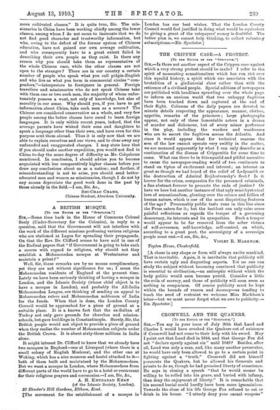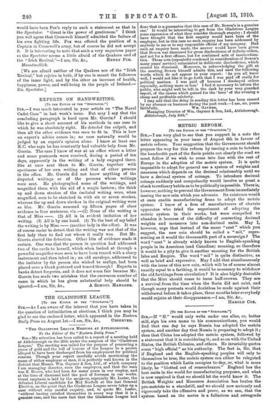CROMWELL AND THE QUAKERS.
[TO THE EDITOR OF THE "SPECTITOR:]
SM,—You say in your issue of July 30th that Land and Charles I. would have crushed the Quakers out of existence if Cromwell had not come to their help with his sword. May I point out that Land died in 1644, and that George Fox did not "declare openly against sin" until 1649 ? Besides, after all, Laud was only a man, and, like many another persecutor, he would have only been allowed to go to a certain point in fighting against a "truth." Cromwell did not himself persecute the Quakers, but he allowed his Generals and priests to do so, though he had promised liberty of conscience. He says in closing a speech "that he would sooner be willing to be rolled into his grave, and buried with infamy, than deny the enjoyment of liberty." It is remarkable that his second burial could hardly have been more ignominious. Towards the close of his life George Fox refused to eat or drink in his house. "I utterly deny your carnal weapons" would have been Fox's reply to such a statement as that in the Spectator. "Great is the power of gentleness." I think you will agree that Cromwell himself admitted the failure of his own fighting life. Fox was offered the position of a. Captain in Cromwell's army, but of course he did not accept it. It is interesting to note that such a very sagacious paper as the Spectator seems a little afraid of the Quakers and of
the "Irish Revival."—I am, Sir, &c., HENRY PIM. Mountmellick.
[We are afraid neither of the Quakers nor of the "Irish Revival," but rejoice in both, if by one is meant the followers of the inner light, and by the other an increase of health, happiness, power, and well-being in the people of Ireland.— En. Spectator.]







































 Previous page
Previous page